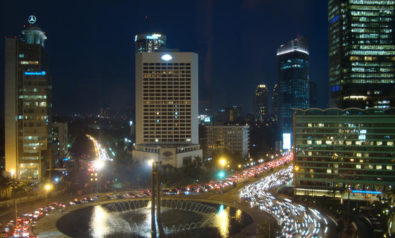Malaysia’s economy is dependent upon non-renewable energy sources, but the fuel subsidies that allow industrial growth are costly and cannot be maintained by the government. In order for industries to remain internationally competitive an alternative must be found.
An intimate link exists between Malaysia’s economy and its energy supplies. Like the majority of countries in the region, Malaysia’s industries rely heavily on non-renewable supplies of fuel such as oil, coal, and gas. However, sustainable long-term economic growth in Malaysia is dependent upon a steady supply of energy. While there are abundant non-renewable energy sources in Malaysia, such resources are not limitless. According to an energy report by the Asia-Pacific Economic Cooperation (APEC) in 2011, Malaysia’s oil reserves are expected to deplete in the future. As a country that consumes approximately 556,000 barrels of oil per day, this would leave Malaysia’s economy vulnerable to global fluctuations of oil price.
A reasonable response for Malaysia would be to prepare for such a potential energy crisis by exploring alternative energy solutions and gradually weaning its industries off non-renewable energy sources. The problem here is Malaysia’s fuel subsidies; initiated in 1982 by the Mahathir administration, the Approved Price Mechanism (APM) for petroleum products maintains the consumer price of petroleum products. However, the mechanism also ensures that producers receive the market price for petroleum products through adjustments in tax or subsidies. As oil prices rise, this creates an ever-increasing subsidy that the Malaysian government has to finance in order to maintain a low fixed price for petroleum products sold in the country. The 2012 official statistics revealed that the government spends more than RM2 billion (US$645m) every month in subsidies for petroleum products.
This means that consumption in the Malaysian economy is partly driven by such fuel subsidies. An economic crisis is inevitable if this continues and the price of oil rises beyond the ability of the Malaysian government to finance the fuel subsidy. But fuel subsidies have also encouraged a kind of dependency that makes it difficult for any fiscal efforts to rescind the policy without any harmful socio-economic consequences.
Maintaining fuel subsidies
The fuel subsidies have created industrial and business infrastructures that depend on cheap petroleum products to survive. If such subsidies are lifted, Malaysian industries and business might be unable to compete internationally because of increased energy costs. Moreover, inefficient business models and practices are not corrected in economic environments built on artificially low energy prices.
But perhaps the most salient problem caused by maintaining fuel subsidies in Malaysia is its serious opportunity cost. State funds that could have been directed to projects that improve the infrastructure of the country are used instead to finance the fuel subsidy. The collective sum of financing the subsidy for years could have been used for welfare schemes or better still, poured into the research and development of alternative energy solutions. The problem of maintaining this subsidy is evident to the larger global community and will have effects on foreign investments in Malaysia.
Recently, the Foreign Office of the United Kingdom released an unflattering business report about the use of fuel subsidies in Southeast Asia – Malaysia was one of the countries scrutinized.
The Malaysian government recognises the costs of maintaining a fuel subsidy. In 2012, Prime Minister Najib Tun Razak declared that the country could not depend on fuel subsidy-driven consumption to boost the economy in the long run. Yet, there is little indication that any action to remove the fuel subsidies will be taken soon. This can be largely attributed to the coming general elections that are to be held before June 2013. The fuel subsidies are immensely popular in Malaysia and any attempt by the government to rescind them will surely be met with a public backlash.
As the price of oil steadily creeps upwards, the Malaysian government needs to find a solution to its energy concerns. Since the nuclear crisis at Fukushiwa, public support for using nuclear energy as an alternative has declined. Pandering to the demands for fuel subsidies has cost Malaysia economically. The country’s current steady growth rates belie the severe implications of maintaining fuel subsidies. Malaysia requires a solution to its energy problems if it desires to sustain the long-term trajectory of its economic growth. Taking the first step to reduce its fuel subsidies is high on the agenda.
The views expressed in this article are the author's own and do not necessarily reflect Fair Observer’s editorial policy.
Support Fair Observer
We rely on your support for our independence, diversity and quality.
For more than 10 years, Fair Observer has been free, fair and independent. No billionaire owns us, no advertisers control us. We are a reader-supported nonprofit. Unlike many other publications, we keep our content free for readers regardless of where they live or whether they can afford to pay. We have no paywalls and no ads.
In the post-truth era of fake news, echo chambers and filter bubbles, we publish a plurality of perspectives from around the world. Anyone can publish with us, but everyone goes through a rigorous editorial process. So, you get fact-checked, well-reasoned content instead of noise.
We publish 2,500+ voices from 90+ countries. We also conduct education and training programs
on subjects ranging from digital media and journalism to writing and critical thinking. This
doesn’t come cheap. Servers, editors, trainers and web developers cost
money.
Please consider supporting us on a regular basis as a recurring donor or a
sustaining member.
Will you support FO’s journalism?
We rely on your support for our independence, diversity and quality.










Comment